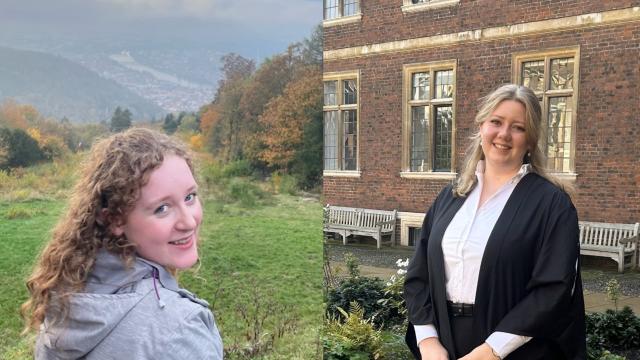
St Catharine’s is in the process of developing its first Environmental Sustainability Strategy to set out how the College community intends to reduce its environmental impact. Led by the College’s Green Working Group, the strategy will also harness the positive influence and expertise of students, staff, Fellows and alumni to encourage and support other communities to take action.
Professor Bill Sutherland CBE (2008), Environment Fellow and Chair of the Green Working Group, comments, “Everyone at St Catharine’s should be proud of our community’s recent contributions to advancing environmental sustainability, whether that’s through world-class research that advances policy and academic discourse, or tireless efforts going on behind the scenes to improve how the College operates. I am excited to be working with students, staff and Fellows represented by the Green Working Group to develop our first ever Environmental Sustainability Strategy, which we will publish and start implementing as a priority this academic year.”
Asya Ostrovsky and Adam Durrant, Environment & Ethical Officers on the St Catharine’s JCR Committee, explain, “It is important to us that the right values are at the core of the College’s new strategy; the changes made should be fair and just as well as being climate positive. The development of the strategy has allowed us to take stock of what we’ve achieved and where we still need to make meaningful changes. With all the right people in the right room working to a single strategy, we can progress much more quickly towards being a climate positive community.”
Environmental sustainability snapshot: Recent examples of activity at St Catharine’s
- In an ethical investment strategy published in 2020, St Catharine’s recognised climate change as one of the biggest challenges that humanity has ever faced, introducing restrictions on investing in fossil fuel, arms, tobacco or gambling industries, and managing the College’s own agricultural land to maximise long-term soil health and biodiversity.
- Baseline emissions for the College are being calculated to enable us to assess the impact of future interventions that may be implemented as part of the new Environmental Sustainability Strategy.
- Professor Sir Mark Welland, in his capacity as Director of the Maxwell Centre, has made zero carbon the primary focus of the centre, with research and commercial engagement focusing on technologies that realise reduced carbon emission.
- Professor Julian Allwood leads the Use Less Group, which supports the mitigation of climate change through reducing demand for the energy intensive material, and heads up a consortium of academic experts called UK FIRES, which published the Absolute Zero report challenging a reliance on breakthrough technologies to achieve zero emissions by 2050.
- Lord Des Browne raised awareness of the Absolute Zero report by initiating a debate in the House of Lords on technological and lifestyle efforts both to address climate change and to meet the UK's 2050 net zero carbon emissions target.
- Sustainability is at the heart the College’s major building projects, as typified by the Central Spaces project, which includes improved natural daylight and thermal performance in the new Dining Hall and atrium, and a new kitchen designed to enable a switch from gas to electric power and a 40% reduction in water demand. Temporary planting has also been installed in front of the Catzebo during the building works, which will be reused for other properties in the future.
- St Catharine’s is a proud member of both the Sustainable Restaurant Association and Green Tourism Business Scheme, and our Conference & Catering team are reducing waste and sourcing produce more sustainably.
- Student representatives are creating a ‘Green Guide’ to encourage students to take steps to reduce, reuse and recycle waste, and explain the infrastructural and operational processes already in place at St Catharine’s.
- Students and staff recently worked together on a successful pilot of compostable waste bins in student kitchens, which is being rolled out across more households during Michaelmas Term.
- St Catharine’s will continue to invest in a varied programme of digital activities for widening participation, alumni relations and worship, so individuals can connect with the College community from wherever they are in the world:
- Within the last year, over 6,500 prospective students and supporters participated in virtual events organised by Kathryn Singleton, the College’s Outreach Manager.
- A highlight from the calendar of online events hosted by Alumni & Development Office was the inaugural St Catharine’s Alumni Festival in March 2021, which was attended by 300 Members and friends from across the globe.
- Chapel services have been live-streamed via YouTube for the last year.
- We are incorporating video conferencing facilities as part of the Central Spaces project and considering how some of our existing spaces can be used as hybrid meeting rooms
- Since May 2021, St Catharine’s alumni have been able to choose how they receive publications (in print, digitally or both, as required), which will help to avoid waste and preserve natural resources if some alumni prefer not to receive hard copies.
- From 2022, the College’s alumni publications will be produced with 100% recycled paper, inks where there is evidence that steps have been taken to reduce their environmental impact (e.g. vegetable-based inks) and wrapping chosen based on the latest sustainability best practice.
To get involved in the activities of the Green Working Group, contact the Group's secretary Ally Barrett, JCR representatives or the MCR Green Officer.


